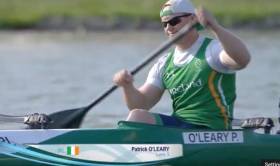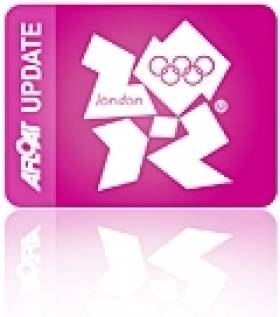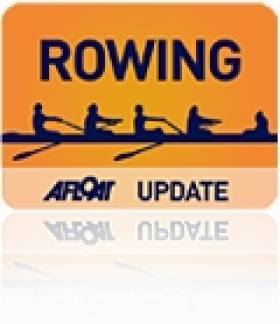Displaying items by tag: Paralympic Games,
#Canoeing: Patrick O’Leary realised his dream of qualifying his boat for his second successive Paralympic Games today. The Ireland canoeist finished fifth in the A Final of the VL3 200 metres at the canoe sprint World Championships in Szeged, Hungary. Curtis McGrath of Australia took the gold. O’Leary, who had won his semi-final, was in fourth or fifth right through a race in which six boats qualified for Tokyo.
Barry Watkins missed out on a chance of qualifying for the Olympic Games in the K1 500. The Irishman took sixth in his semi-final and will compete in a B Final.
Canoe Sprint World Championships, Szeged, Hungary (Irish interest)
Men
K1 500 Semi-Final Three: 6 Ireland (B Watkins) 1:40.38.
Paracanoeing – Men’s VL3 200m A Final (Top six nations qualify for Paralympic Games): 1 Australia (C McGrath) 47.42 seconds; 5 Ireland (P O’Leary) 49.27.
Irish Paralympic Sailing Trio Lying Ninth
#paralympic – Irish paralympic sailing trio John Twomey, Anthony Hegarty and Ian Costello, placed 11th and 7th in the three-person Sonar keelboat class in the first races of the Paralympic games in Weymouth today. They finish Day 1 in 9th overall with a further nine races left to sail.
Taking place from 1 September to 6 September, three gold medals will be up for grabs by the 80 competitors: in the Single-Person Keelboat, Two-Person Keelboat and Three-Person Keelboat. Athletes will compete to master the ever-changing conditions on the open waters of Weymouth Bay and Portland Harbour during the Paralympic Sailing competition.
Ireland is only conrtesting the three person keelboat medal.
The athletes are classified based on their ability to perform the sport using a point system: the higher the points, the greater the ability.
A moderate south westerly breeze saw the team get off to a solid start in Race 1. They began in the middle of the fleet but slipped back to 13th only to climb back up the fleet to 10th but ultimately finishing in 11th. Race 2 saw team back in 13th rounding the first mark but they fought hard challenging their opponents to claim six places to finish in 7th.
John Twomey commented "It was very shifty conditions especially in Race 1. It's early days and we're hoping to improve on our performance today".
The 2012 Paralympics are John Twomey's 10th Paralympics, a record for any Irish person competing at either the Olympics or Paralympics. Having competed initially in the discus where he won bronze in 1984 and gold at Seoul 1988, John progressed to table tennis and finally to sailing which has been his sport of choice since 1996. Anthony Hegarty has been involved in sailing since 2005 but this is his first time competing at the Games. This is also Ian Costello's Paralympic debut.
Ireland Adaptive Rowing Crew Set For Repechage At Paralympic Games
# ROWING: Ireland’s adaptive mixed coxed four of Anne Marie McDaid, Sarah Caffrey, Shane Ryan, Kevin du Toit and cox Helen Arbuthnot will compete in a repechage tomorrow after finishing fifth in their heat at the Paralympic Games at Eton Dorney today. The Ireland coach, John Armstrong, was pleased with the Ireland performance, and they were never far off places two to four. The race was won well by the dominant crew in this discipline, Britain, who claimed the one direct qualification for the A Final. The top two crews in tomorrow’s two repechages will qualify for Sunday’s A Final.
Paralympic Rowing Regatta, Eton Dorney – Day One
Legs, Trunks and Arms Mixed Coxed Four – Heat Two (Winner Directly to A Final; rest to Repechages): 1 Britain 3:23.59; 5 Ireland 3:33.95.


























































